
JunOS_2_routingessentials
.pdf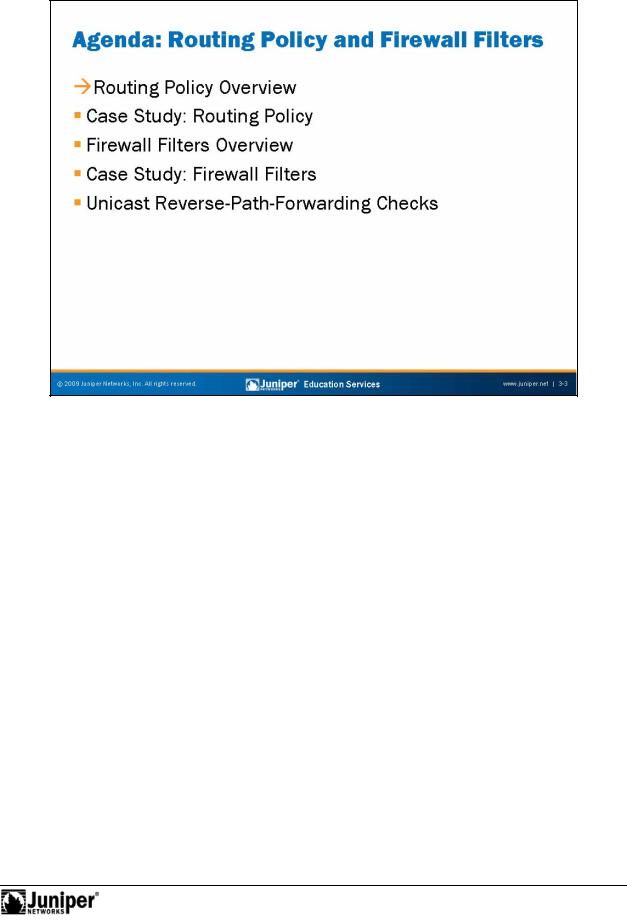
Not
JUNOS Routing Essentials
Routing PolicyReproductionOv rvi w
The slide lists the topics we cover in this chapter. We discuss the highlighted topic
first. for
Routing Policy and Firewall Filters • Chapter 3–3
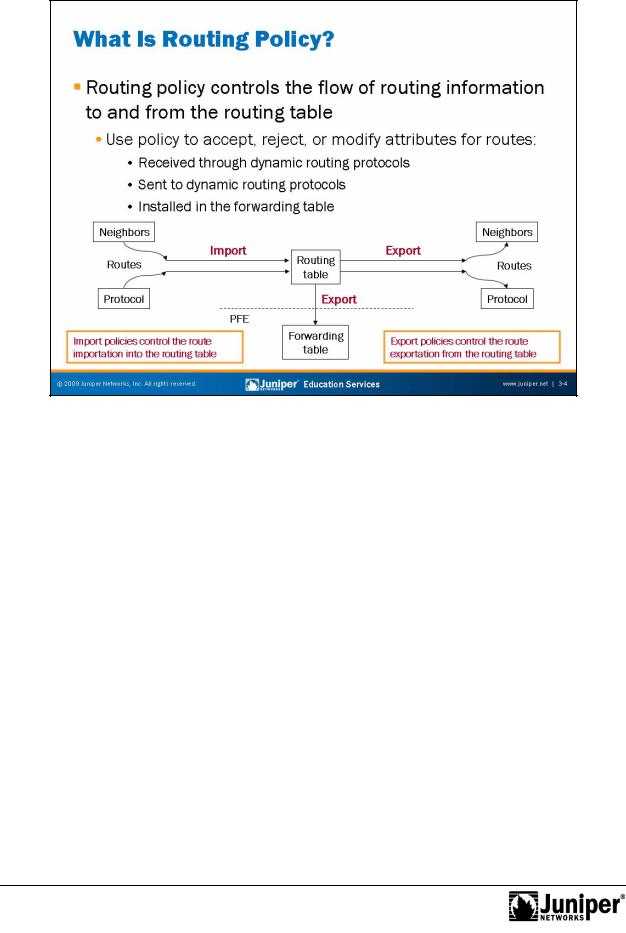
JUNOS Routing Essentials
An Overview of Routing Policy
Routing policy allows you to control the flow of routing information to and from the |
||||
routing table. You can apply routing policy as information enters the routing table and |
||||
as information leaves the routing table. |
||||
You can use |
|
Reproduction |
||
uting policy to choose which routes you accept or reject from neighbors |
||||
running dynamic uting protocols. You can also use routing policy to choose which |
||||
rou es you send to neighbors running dynamic routing protocols. Routing policy also |
||||
all |
ws y u |
|
modify attributes on routes as they enter or leave the routing table. |
|
|
|
for |
|
|
R |
uting policy allows you to control the flow of routing information into the forwarding |
|||
Not |
|
|
||
table. This use allows you to control which routes you install in the forwarding table and to control some of the attributes associated with those routes.
Continued on next page.
Chapter 3–4 • Routing Policy and Firewall Filters

JUNOS Routing Essentials
An Overview of Routing Policy (contd.)
Policies that control how the software imports routes into the routing table are named import policies. The software applies import policies before placing routes in the routing table. Thus, an import policy can change the routes that are available in the routing table and can affect the local route selection process.
Policies that control how the software sends routes from the routing table are named export policies. The software applies export policies as it exports routes from the routing table to dynamic routing protocols or to the forwarding table. Only active routes are available for export from the routing table. Thus, while an export policy can choose which active routes to export and can modify attributes of those routes, it cannot cause the exportation of inactive routes.
For example, suppose you have an OSPF route (preference 10) and a BGP route (preference 170) for the same prefix. An export policy determi es whether to send the active OSPF route and modifies attributes of the route as the software sends it. However, the export policy cannot cause the software to se d the inactive BGP route.
|
JUNOS Software applies export policies as it expor s utes from the routing table, so |
|
|
attribute changes do not affect the local routing able; rather, the software applies |
|
|
them to the route while exporting it. |
|
|
for |
Reproduction |
Not |
|
|
|
|
|
Routing Policy and Firewall Filters • Chapter 3–5
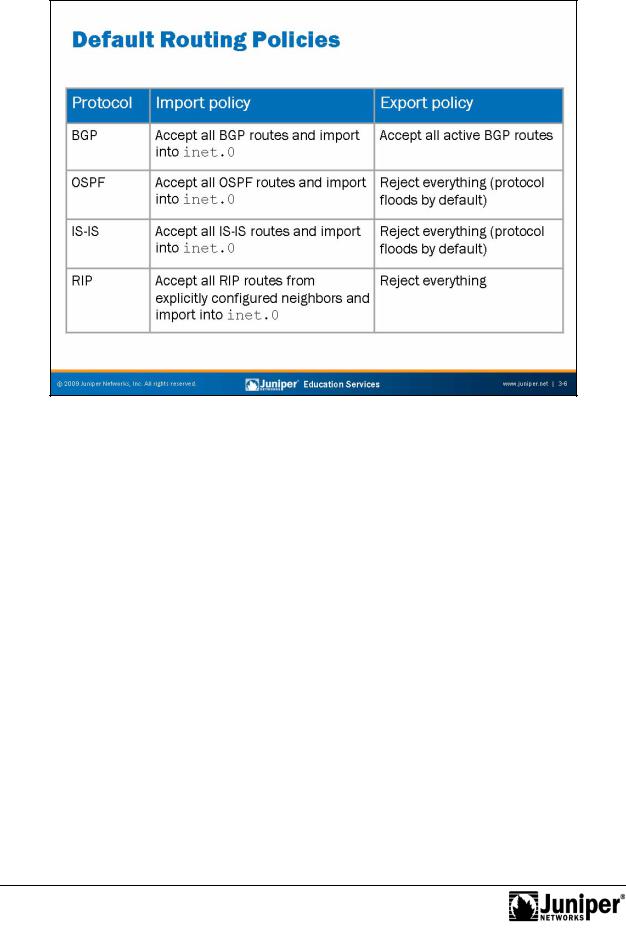
JUNOS Routing Essentials
Default Routing Polici s
Every protocol has a default import policy and a default export policy. The chart on the slide summarizes the default import and export policies for several common routing
protocols. |
|
Reproduction |
|
|
|
BGP’s de ault imp t policy is to accept all routes from BGP neighbors and install them |
||
in the routing table. BGP’s default export policy is to advertise all active BGP routes. |
||
For BGP, you can configure import and export policies at the protocol, group, and |
||
neighb r levels. |
|
|
|
for |
|
The default OSPF import policy is to import all OSPF routes. As a link-state protocol, |
||
OSPF maintains a consistent link-state database throughout each OSPF area by |
||
flooding link-state advertisements (LSAs). You cannot apply policy to affect the |
||
maintenance of the local link-state database or the flooding of LSAs. Additionally, you |
||
Not |
|
|
cannot apply policy that prevents the software from installing internal (including interarea) routes in the routing table. (A link-state protocol assumes that all devices have the same routing information for internal routes, which causes all devices to make consistent forwarding decisions. If you could block internal routes from entering the routing table, you could create routing loops or cause certain prefixes to become unreachable.) However, you can apply policy that blocks external routes.
Continued on next page.
Chapter 3–6 • Routing Policy and Firewall Filters

JUNOS Routing Essentials
Default Routing Policies (contd.)
The default OSPF export policy (which rejects everything) does not cause the system to stop flooding LSAs through the area. Rather, the system always floods LSAs throughout the OSPF area, and the routing policy cannot control that behavior. The default export policy simply blocks the advertising of additional routes from other sources to OSPF neighbors. If you want to advertise other routes through OSPF, you must configure an explicit export policy.
Because link-state protocols rely on all participating devices having consistent link-state databases, you can configure import and export policies only at the protocol level.
|
|
|
The default policy for RIP is to import all routes learned from explicitly configured |
||
|
|
|
neighbors. The software ignores routes learned from neighbors not explicitly defined |
||
|
|
|
|
Reproduction |
|
|
|
|
within the configuration. By default, the software does ot export routes to RIP |
||
|
|
|
neighbors, including RIP routes. Thus, to advertise any routes to RIP neighbors, you |
||
|
|
|
must configure an export policy that matches and accepts RIP routes as shown in the |
||
|
|
|
following sample output: |
|
|
[edit policy-options] |
|
|
|||
user@host# show |
|
|
|
||
policy-statement export-rip-routes { |
|
||||
|
term match-rip-routes { |
|
|||
|
|
from protocol rip; |
|
|
|
|
} |
then accept; |
|
|
|
} |
|
|
|
|
|
|
|
|
|
|
|
|
|
|
For RIP, you can apply im ort |
olicies at the protocol level and neighbor level, |
|
|
|
|
whereas you can configure ex |
ort policies only at the group level as shown in the |
|
|
|
|
following sample output: |
|
|
[edit protocols rip] |
|
|
|||
} |
|
|
for |
|
|
user@host# show |
|
|
|
||
group my-rip-group { |
|
|
|||
|
export export-rip- utes; |
|
|||
|
neighbor ge-0/0/1.0; |
|
|
||
|
neighbor se-1/0/0.0; |
|
|
||
|
|
Not |
|
|
|
Routing Policy and Firewall Filters • Chapter 3–7
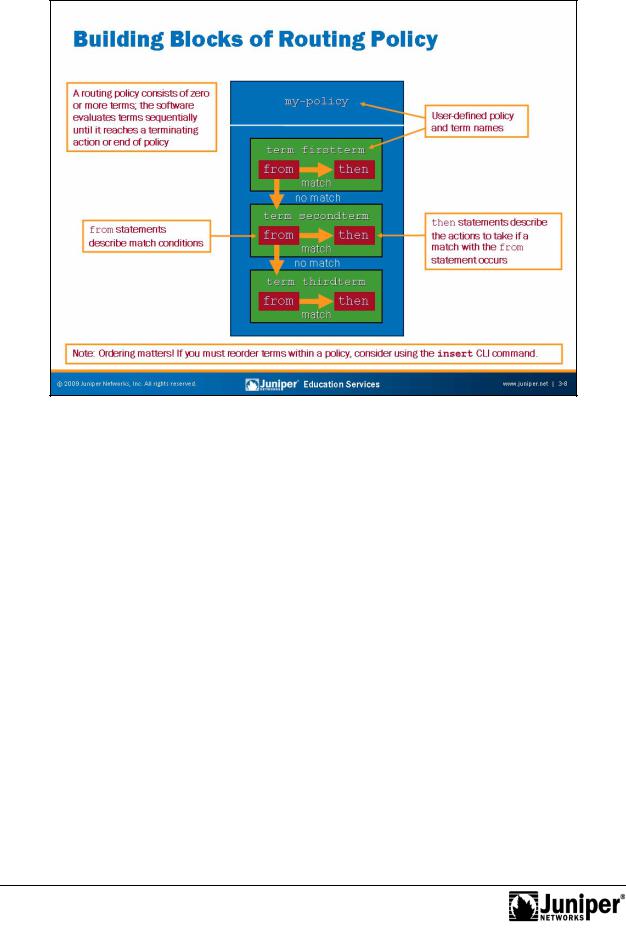
JUNOS Routing Essentials
Building Blocks of Routing Policy
Routing policies contain ordered groups of terms. You give routing policies a name, |
|
which you use to identify them at different locations in the configuration. |
|
Terms are the basic building blocks of all JUNOS Software policy. They are essentially |
|
|
Reproduction |
if...then statements. If all the match conditions specified in the from statement are |
|
true (or if no m statement is specified), all the actions in the then statement are |
|
execu ed. You give terms a name. The name has no effect on the evaluation of the |
|
term; ra her, it provides a meaningful identifier that you can use when referring to the |
|
for |
|
term. |
|
Not |
|
When evaluating the from statement, JUNOS Software performs the evaluation as a logical OR between arguments to a single match criterion and a logical AND between different match criteria. In other words, for the from statement to be considered true, the item being evaluated must match at least one of the arguments to each given match criterion.
Continued on next page.
Chapter 3–8 • Routing Policy and Firewall Filters

JUNOS Routing Essentials
Building Blocks of Routing Policy (contd.)
If a route matches all the conditions in the from statement of a term, JUNOS Software executes all the actions specified in the then statement of that term. Provided that one of those actions is a terminating action, the evaluation of the policy stops.
The actions that control the acceptance and rejection of routes (accept and reject) are terminating actions. Using these terminating actions results in a first-match policy evaluation because the software takes the specified action immediately and performs no further evaluation of the policy.
When JUNOS Software evaluates a policy, it evaluates each term sequentially. If needed, you can use the insert CLI command in configuration mode to modify the order in which terms appear.
|
for |
Reproduction |
Not |
|
|
|
|
Routing Policy and Firewall Filters • Chapter 3–9
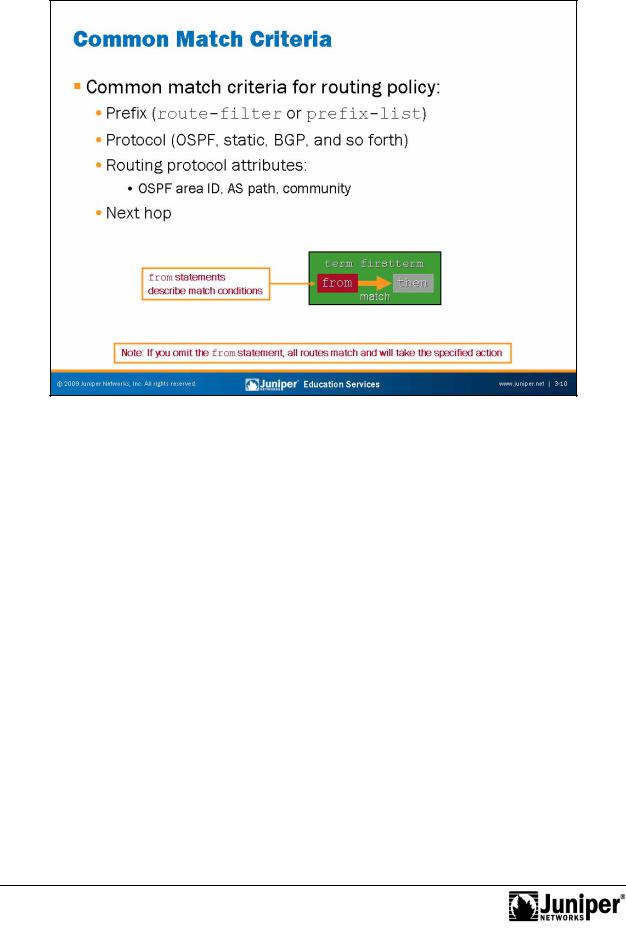
JUNOS Routing Essentials
Common SelectionReproductionCrit ria
The slide shows some of the criteria you can use to select routes with from statements. You can select routes based their prefix, protocol, some routing protocol attributes,for next hop information. We highlight the route-filter and prefix-list match criteria options on subsequent slides.
Note that if y u mit the from statement in a policy or a policy’s term, the software Notsubjec s all routes to the referenced action specified in the then statement.
Y u can view the full list of match criteria in the CLI interactive help and in the JUNOS P licy Framework Configuration Guide.
Chapter 3–10 • Routing Policy and Firewall Filters
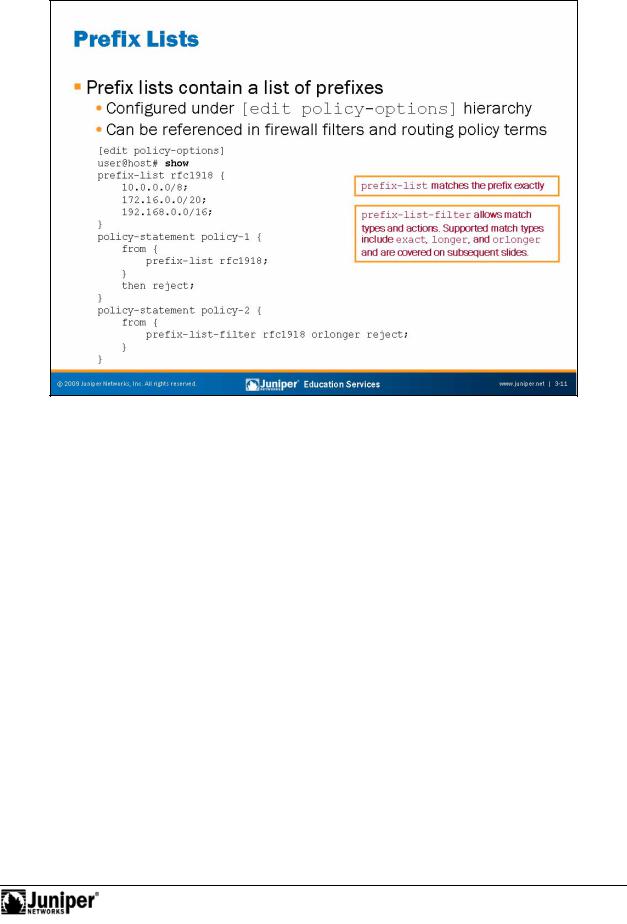
JUNOS Routing Essentials
You can selectReproductionroutes based their prefix using a prefix list or a route filter. forPrefix lists a e named lists of prefixes configured under the
Prefix Lists
[edit p licy-options] hierarchy. One of the advantages of prefix lists is that y u can use them in multiple places. You can reference prefix lists in multiple terms in a single p licy or in different policies. In addition, you can use prefix lists both for
Notrou ing policies as well as firewall filters (but not stateful firewall rules). This reusability makes prefix lists attractive in some circumstances.
You can use prefix lists in two ways in the from statement of routing policies. When referenced in a prefix-list statement, routes match only if they exactly match one of the prefixes in the list. When referenced in a prefix-list-filter statement, you can specify a match type of exact, longer, or orlonger to be applied to the listed prefixes. You can also specify an optional action to be taken if the filter matches. This action is executed immediately after the match occurs, and the then statement is not evaluated. We explain the match types in more detail later in this chapter.
Routing Policy and Firewall Filters • Chapter 3–11
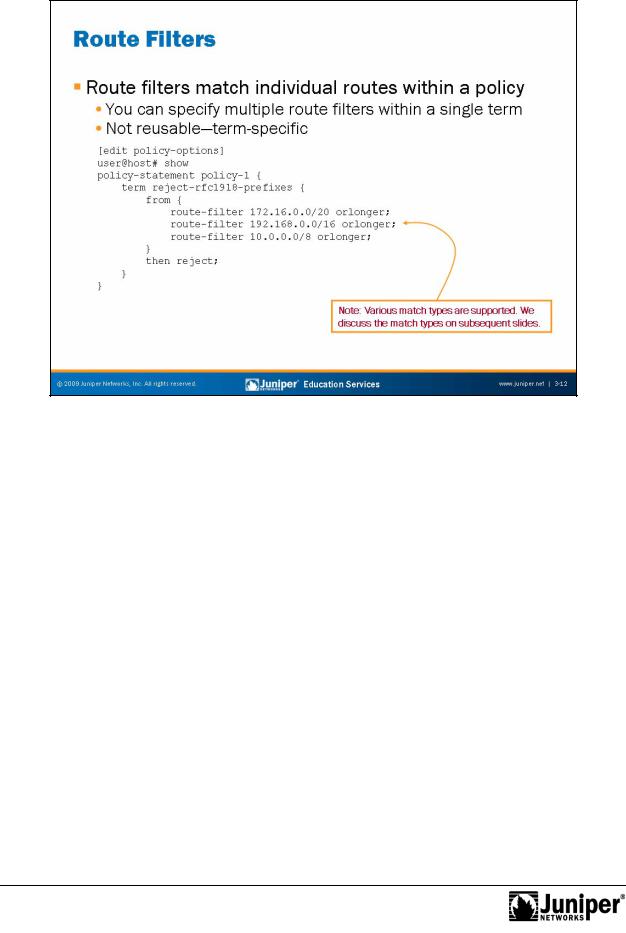
JUNOS Routing Essentials
Route filters are lists ofReproductionprefixes configured within a single routing policy or policy term. Unlike p efix lists, they are not reusable but rather are specific to the policy or
term in which they a e configured. They provide a few more match types for selecting prefixes.forThe ll wing slides detail the available match types. Like with the prefix-list-filter statement, you can specify an optional action to be taken if
Notthe rou e- ilter statement matches. This action is executed immediately after the ma ch occurs, and the then statement is not evaluated.
Chapter 3–12 • Routing Policy and Firewall Filters
